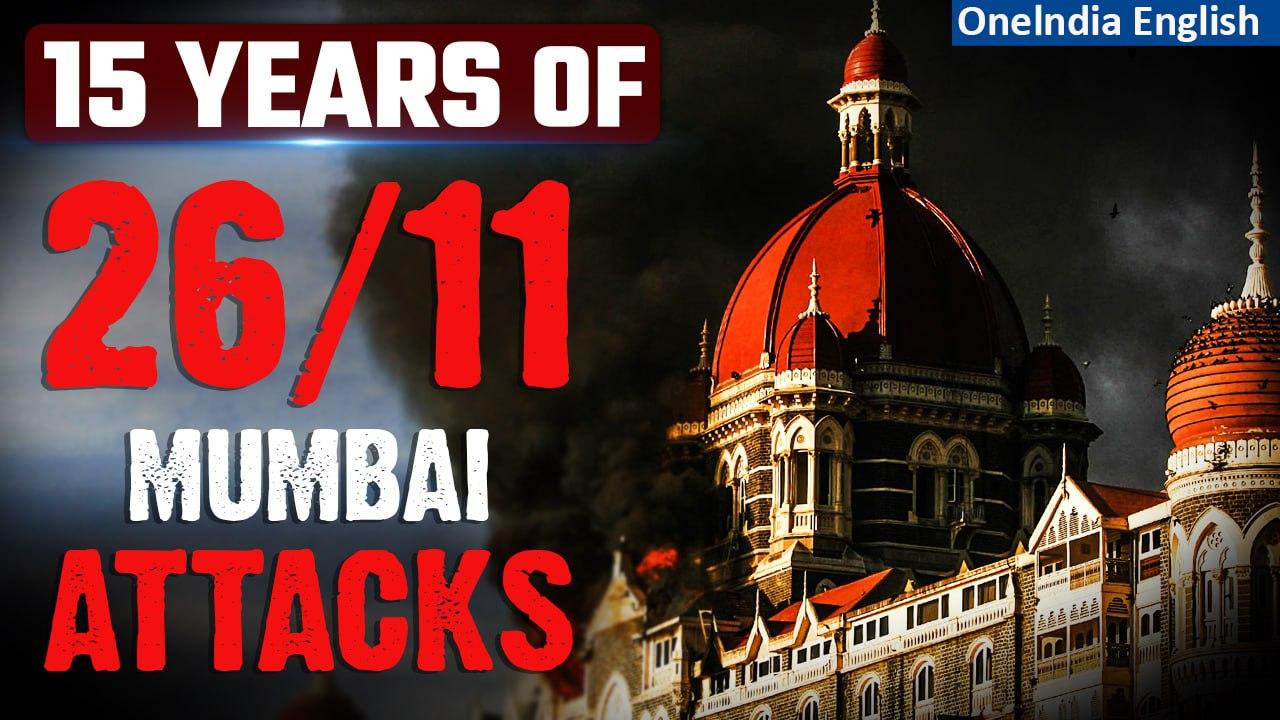


On the 16th anniversary of the 26/11 terror attacks, India remembers the brave security personnel who sacrificed their lives and expresses solidarity with the victims' families. Leaders, including President Droupadi Murmu, Defence Minister Rajnath Singh, and Home Minister Amit Shah, pay homage and reiterate India's firm commitment to defeating terrorism. The attacks, carried out by Pakistan-based Lashkar-e-Taiba, are described as a "cowardly act" and a "blot on humanity."
Remembering the Mumbai 26/11 Terror Attacks: India's Unwavering Stand Against Terrorism
Background
On November 26, 2008, the city of Mumbai was subjected to a series of coordinated terrorist attacks by 10 Lashkar-e-Taiba (LeT) militants from Pakistan. The attackers targeted multiple locations across the city, including the Taj Mahal Palace Hotel, the Oberoi Trident Hotel, the Nariman House Jewish community center, and the Chhatrapati Shivaji Terminus railway station. The attacks lasted over four days and resulted in the deaths of 166 people, including 26 police officers and 11 hotel staff.
Commemoration and Homage
On the 16th anniversary of the attacks, India paid homage to the brave security personnel who sacrificed their lives and expressed solidarity with the victims' families. President Droupadi Murmu, Defence Minister Rajnath Singh, and Home Minister Amit Shah led the nation in paying tribute and reiterating India's firm commitment to defeating terrorism.
Leaders from across the political spectrum condemned the attacks as a "cowardly act" and a "blot on humanity." Prime Minister Narendra Modi said that the nation would always remember the sacrifices of the brave security forces and would never forget the victims of the tragedy.
India's Response and Legacy
Following the attacks, India launched a comprehensive investigation and took several measures to strengthen its counter-terrorism capabilities. These included:
Top 5 FAQs and Answers
Q1: Who were the attackers? A1: The attacks were carried out by 10 Lashkar-e-Taiba (LeT) militants from Pakistan.
Q2: What was the motive behind the attacks? A2: The attackers' motive was to wage a war against India and create chaos and fear.
Q3: How many people died in the attacks? A3: A total of 166 people were killed, including 26 police officers and 11 hotel staff.
Q4: What is India's stance on terrorism after the 26/11 attacks? A4: India has adopted a zero-tolerance approach to terrorism and has taken several measures to strengthen its counter-terrorism capabilities.
Q5: What is the significance of commemorating the 26/11 attacks? A5: Commemorating the attacks serves as a reminder of the sacrifices made by security forces, the resilience of the victims' families, and India's unwavering commitment to fighting terrorism. It also helps raise awareness about the importance of countering terrorism and fostering peace and harmony.

The Congress party declared a moral and legal triumph after the Delhi court dismissed the Enforcement Directorate's chargesheet in the National Herald-Young Indian case. The judge noted that the chargesheet was based on a private complaint rather than an FIR, making it legally inadmissible. The Congress accused the Modi government of maliciously targeting its leaders and misusing central agencies for political gain. They vowed to continue fighting for truth and democratic rights, asserting that nothing could deter them from their mission.

India commemorates Vijay Diwas every year on December 16 to honour the soldiers who sacrificed their lives during the 1971 war with Pakistan, which resulted in the creation of Bangladesh. As part of this year's celebrations, the Indian Army displayed a reconstructed Turkish armed drone, Yiiha, which was shot down by India during Operation Sindoor on May 10. The Kamikaze class of drones, also known as "suicide drones," were used by Pakistan to target Indian military and civilian installations, but were almost all destroyed by the Indian military.

India celebrates the 54th Vijay Diwas, honoring the bravery and sacrifice of its soldiers in the 1971 war that led to the liberation of Bangladesh. Political leaders, including Prime Minister Narendra Modi and President Droupadi Murmu, pay glowing tributes to the armed forces and their unmatched courage. The Army marks the occasion by recalling the historic triumph and the flawless coordination between different branches of the military, with an impressive Military Tattoo in Kolkata.

Renowned spiritual leader and former BJP MP, Ram Vilas Vedanti, passed away at the age of 67 due to a heart attack. Known for his significant role in the Ram Janmabhoomi movement, Vedanti had been admitted to a hospital in Rewa for a blood infection and low blood pressure. Attempts to transport him to a better medical facility were unsuccessful due to bad weather. Political leaders, including Uttar Pradesh Chief Minister Yogi Adityanath, expressed their condolences and praised Vedanti's contributions to society.

Indian Ambassador to the United Nations, Harish P, slammed Pakistan for misusing international platforms for its hostile agenda against India at the UNSC Open Debate on “Leadership for Peace”. He objected to Pakistan’s reference to Jammu and Kashmir and questioned its democratic credentials while reaffirming India’s stance on cross-border terrorism. This reflects the ongoing strain in India-Pakistan relations and New Delhi’s determination to counter any attempt by Islamabad to internationalise bilateral disputes.

As Delhi's air quality reached hazardous levels with an AQI of 500, the city saw 228 flight cancellations and over 400 diversions. In response, the regional government ordered all schools up to Class 5 to shift to online classes. The severity of the situation has also prompted advisories from the Singapore High Commission for its nationals living in Delhi and NCR to stay indoors and wear masks when going out.

A fierce gunfight broke out between security forces and terrorists in a remote village in Jammu and Kashmir, resulting in the death of a policeman and injuries to a terrorist. The encounter was based on specific intelligence inputs, and the terrorists are believed to be affiliated with the Pakistan-based Jaish-e-Mohammad outfit. Despite facing difficulties due to darkness and rough terrain, security forces continue efforts to neutralize the remaining terrorists as the operation has been suspended for the night and will resume at first light on Tuesday. With high alerts in place, the area has been cordoned off to prevent any further attempts by the terrorists to escape.

Controversy swirls around Bihar Chief Minister Nitish Kumar as a video goes viral of him attempting to remove the hijab of a Muslim woman doctor during an appointment letter distribution ceremony. The incident has been met with widespread outrage and criticism from opposition parties, with calls for Kumar's resignation. Shiv Sena UBT leader Priyanka Chaturvedi has also condemned the act, calling it a "public harassment." This incident raises concerns about safety and respect for women in the state of Bihar.

BJP National General Secretary Tarun Chugh expresses concern over the recent bomb threat emails that were sent to 11 schools in Jalandhar, Punjab. Chugh criticizes the AAP government for failing to control the spread of terror and creating a sense of panic among school children. This comes after a free eye medical camp was organized in Ongole, with MLA Damacharla Janardhana Rao emphasizing the consistent efforts of DJR Trust in serving the poor and underprivileged.

A controversy has erupted in Patna after a video went viral showing Bihar Chief Minister Nitish Kumar allegedly removing the headscarf of a woman AYUSH doctor during a government programme. The incident has drawn strong criticism from opposition parties like the Rashtriya Janata Dal and the Congress, with the latter calling for Kumar's immediate resignation. The CM's actions have raised concerns about women's safety in the state and have been deemed "shameful" and "disgusting" by political leaders. The event was organized to distribute appointment letters to newly recruited AYUSH doctors who will be deployed to improve healthcare delivery in Bihar.